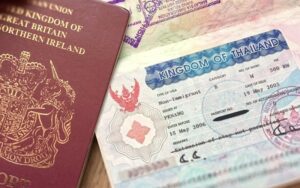Thailand SMART Visa is built to attract science-and-technology talent, investors, executives, and startup founders into BOI-designated “S-Curve” industries. Unlike the standard Non-Immigrant “B”, SMART Visa streamlines work authorization and family rights, while extending permitted stay. Here’s a practitioner’s view of what it is, who qualifies, and how to run the process end-to-end in 2025.
What makes SMART Visa different
Across all SMART categories you see four headline advantages: (1) permission to stay of up to four years (subject to contract term for employed categories), (2) work-permit exemption for the main holder when working with endorsed entities, (3) annual—rather than 90-day—immigration reporting, and (4) multiple re-entry without a separate permit. Spouses and certain dependents under “SMART O” receive matching stay; in many cases the spouse may work without a work permit. Fees are charged “per year of permission” (10,000 THB/year).
Who SMART is for: the five categories
SMART T (Talent) — science/tech experts employed by an endorsed Thai entity in a targeted industry. Minimum income: 100,000 THB/month, reduced to 50,000 THB/month for experts hired by startups or for “retired experts” with agency endorsement. Max stay up to 4 years (capped by contract; 2 years when working for a startup). Employers must be certified as operating in targeted sectors; expertise must be endorsed through the Strategic Talent Center (STC) network. Note: digital nomads/remote workers without a Thai assignment are not eligible.
SMART I (Investor) — investors placing capital into technology-based companies in targeted industries. Official FAQ guidance: ≥ 20 million THB direct investment in technology-based manufacturing or services or ≥ 5 million THB in a startup, incubator, or accelerator endorsed by relevant agencies; investment must be maintained for the visa’s validity.
SMART E (Executive) — senior management of endorsed companies in targeted industries, with Bachelor’s degree or higher, ≥ 10 years relevant experience, and ≥ 200,000 THB/month income; must hold a senior role (e.g., MD, director). Stay up to 4 years, capped by contract.
SMART S (Startup) — technology-based startup founders in targeted industries. Baselines include ≥ 600,000 THB funds held for ≥ 3 months (with extra amounts per dependent), valid health insurance, and founder must be a director or ≥ 25% shareholder in a Thai company in a targeted sector. Permission can be granted for up to 2 years depending on endorsement type.
SMART O (Others) — legal spouse and children of SMART holders. Family members receive the same stay as the principal. Spouses can work without a work permit; children’s work rights vary by the principal’s category (see “Reporting & Family Work Rights” below).
Targeted industries are defined by the BOI (often referred to as “S-Curve” sectors). The BOI confirms that SMART is tied to these designated sectors; employer and activity endorsements are part of the process.
The application flow that actually works
Step 1 — Online Qualification Endorsement. Create an account and submit an online qualification endorsement application for the specific SMART type (and SMART O if applicable). Upload all supporting PDFs. The SMART Visa Unit coordinates technical/non-technical endorsements with relevant agencies. The official timeline is “at least 30 working days” from complete dossier to result notification.
Step 2 — Visa Issuance. Once you receive the endorsement letter, you have 60 days to apply for visa issuance either via the MFA e-Visa system (if outside Thailand) or in person at the Immigration Bureau at the Thailand Investment & Expat Services Center (TIESC), One Bangkok, Bangkok. The government fee is 10,000 THB per year of permission (paid at issuance/extension).
Step 3 — Extensions & Changes. For extensions, qualification must be re-endorsed before visiting Immigration at TIESC for the new stamp; the fee is again 10,000 THB per year (pro-rated by months). If you change role, add a second employer, or your SMART-O spouse/child intends to work, you must notify the SMART Visa Unit using the prescribed forms.
Reporting & family work rights (nuances that trip people up)
SMART holders must complete two separate annual reports:
-
Immigration 1-year reporting at OSS/TIESC (replaces 90-day reporting). If you re-enter Thailand, the due date resets to one year from your latest arrival.
-
SMART Unit status report emailed annually with supporting documents:
• SMART T/E: show tax payment evidence (e.g., PND 90/91 or recent PND 1).
• SMART I/S: show updated shareholder list and/or capital transfer evidence; S may also need FBL/FBC if in restricted sectors.
Family work rights:
• Spouse (SMART O) may work without a work permit (subject to prohibited occupations list).
• Children (18+) of SMART T holders with SMART O may work without a work permit; children of SMART E/I/S who wish to work must apply for a work permit at OSS. All must avoid occupations on the prohibited list.
Practical case studies
Case 1: Senior AI scientist hired by a BOI-endorsed digital company (SMART T). The candidate earns 180,000 THB/month and holds a 2-year contract. Employer is certified in the Digital industry; STC endorses the candidate’s expertise. Result: SMART T for up to 24 months (capped by contract), no work permit, spouse obtains SMART O and can take up employment immediately. Annual immigration + SMART Unit reporting required; scientist files PND tax evidence each year.
Case 2: Investor placing 20M THB into a robotics manufacturer (SMART I). The investor directly injects capital meeting the 20M THB threshold, maintains the investment, and receives endorsement. Result: SMART I up to 4 years, no work permit for activities within the endorsed company. Spouse/children receive SMART O; spouse can work without a work permit, but a child wishing to work must apply for a work permit (because the principal is I).
Case 3: Health-tech founder with 600k THB and 30% equity (SMART S). Founder has funds parked for 3+ months, valid health insurance, and the Thai entity operates squarely in the medical hub/digital space. Result: SMART S for up to 2 years (depending on endorsement letter). The founder later adds a consulting gig at an endorsed incubator; they must notify the SMART Unit about the additional employment before starting.
Case 4: Executive transfer to Thailand HQ (SMART E). Regional CFO with 12 years’ experience, Bachelor’s degree, and ≥ 200,000 THB/month moves to Bangkok to oversee a BOI-endorsed smart-electronics group. Result: SMART E aligned to the employment term (up to 4 years); spouse can work without a permit; an adult child would need a work permit.
Documents and checkpoints that commonly derail files
-
Employer & activity endorsement: even perfect CVs fail if the Thai entity isn’t certified as operating in a targeted industry. Get the BOI/agency certificate in hand early.
-
Income thresholds: SMART T/E applications are assessed against stated monthly income floors; startups/retired-expert exceptions for T reduce the threshold to 50,000 THB.
-
Investor proof: for SMART I, attach remittance slips and shareholder list (when applicable) and be ready to prove the company is technology-based in the targeted sector; keep the investment intact through the visa term.
-
Startup funds & insurance: SMART S requires proof of funds for ≥ 3 months (and extra per dependent) plus active health insurance. Ensure shareholding/board position meets the 25%/director rule.
-
Dual annual reporting: don’t confuse immigration’s annual address report with the separate SMART Unit status report; both are mandatory.
Where to file & current implementation notes (2025)
After endorsement, issuance/extension occurs with MFA e-Visa (abroad) or at Immigration, TIESC (One Bangkok). The BOI’s operational pages also reference the transition from paper TM.6 to the Thailand Digital Arrival Card (TDAC) for arrivals from May 1, 2025, a detail now visible in extension and transfer procedures. Budget the 10,000 THB per year government fee for every issuance and extension event.






















